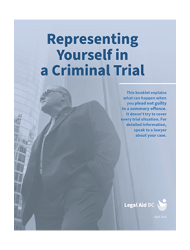A lawyer can give you specific advice on:
- the evidence the Crown prosecutor will probably use and what they have to prove;
- whether talking with the Crown prosecutor about how you could plead may get you a better result than a trial;
- whether you can object to the use of any of the Crown prosecutor’s evidence (see The prosecutor presents the Crown’s case);
- whether any of your rights under the Charter of Rights and Freedoms have been violated, and if so, how this might affect your trial (see The prosecutor presents the Crown’s case);
- how to present your evidence or gather further evidence, including expert evidence;
- legal arguments;
- options to consider for possible sentencing by the judge; and
- whether you should testify.
A lawyer can also:
- explain the disclosure and the Information (see How can I get information about my case?),
- tell you about alternative measures (see Can I avoid getting a criminal record? under Can I avoid going to trial?),
- help you get a stay of proceedings see Can I avoid going to trial?), or
- help you speak to sentence (see What can I do if I’m sentenced?).
If you have questions about any of these matters, write them down as you prepare for your meeting with the lawyer. (Make sure to take notes at the meeting.)
Here are some other things you can do to prepare:
- Get a copy of the Information and the disclosure and read them carefully before you go to the lawyer.
- Write down what happened while it’s still fresh in your mind, but don’t give this to anyone except your lawyer.
- Read the rest of this resource.
